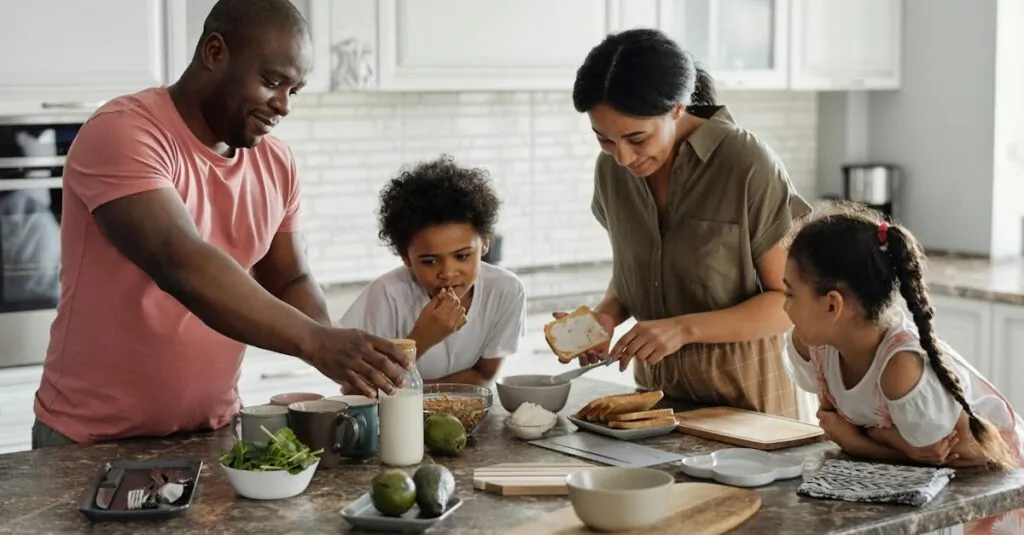Table of Contents
ToggleImagine a kitchen filled with laughter, flour flying through the air, and the sweet aroma of cookies baking. Cooking with kids isn’t just a recipe for delicious treats; it’s a chance to whip up unforgettable memories. When parents invite their children into the kitchen, they’re not just teaching them how to crack an egg or measure sugar. They’re stirring up confidence, creativity, and a sprinkle of teamwork that can last a lifetime.
Benefits of Children Cooking with Parents
Cooking together offers numerous advantages that go beyond tasty dishes. This shared experience cultivates lasting memories and important life skills.
Enhances Bonding
Cooking together strengthens family connections. Through preparing meals, children and parents create shared experiences. Trust grows as they navigate challenges and celebrate successes in the kitchen. Shared tasks, like chopping vegetables and stirring pots, foster collaboration. Playfulness often emerges, turning meal prep into enjoyable moments. Cooking together provides opportunities for laughter and connection, deepening family ties. Working side by side nurtures empathy and understanding. Every recipe becomes a chance to bond and reminisce, enriching family relationships further.
Encourages Communication
Cooking opens avenues for dialogue between parents and children. Open discussions can occur while measuring ingredients or deciding on meal options. Questions about flavors and preferences promote exploration and critical thinking. Cooking also encourages storytelling, as families share their culinary traditions. Verbal communication improves as children express ideas about recipes. Shared problem-solving strengthens conversational skills. As kids ask for guidance, parents model effective communication. This environment fosters confidence and clarity in expressing thoughts. Cooking together sets the stage for meaningful conversations beyond the kitchen.
Skills Developed Through Cooking
Cooking together cultivates numerous skills in children that extend well beyond the kitchen. Engaging in culinary activities nurtures essential life and culinary skills.
Life Skills
Cooking fosters independence and decision-making skills in children. They learn to follow instructions, manage time, and take responsibility for tasks like meal preparation and cleanup. Collaboration becomes second nature as they interact with parents, sharing duties and ideas. Problem-solving skills emerge when they encounter cooking challenges, allowing them to think critically about solutions. Additionally, children gain confidence from successfully completing recipes, which translates to greater self-assurance in other areas of their lives. Social skills also improve, as they practice teamwork while engaging in conversations, learning to express opinions and preferences respectfully.
Culinary Skills
Children develop basic culinary skills through hands-on experiences in the kitchen. They gain familiarity with ingredients, mastering techniques like chopping, mixing, and measuring. Understanding flavor profiles and food pairings becomes intuitive, as they experiment with different combinations. Cooking introduces them to food safety principles, teaching proper handling and hygiene. They learn to appreciate cooking techniques, from baking to grilling, which enriches their culinary repertoire. As they prepare meals alongside parents, creativity flourishes, paving the way for innovative dishes. This practical knowledge lays the foundation for lifelong cooking capabilities that can enhance their health and well-being.
Fun and Creative Cooking Activities
Cooking together offers endless fun and creativity. Families can engage in imaginative activities that enhance their culinary experience.
Themed Cooking Nights
Themed cooking nights introduce an exciting twist to family meals. Families might choose themes like “Italian Night” or “Taco Tuesday.” Everyone can participate in selecting recipes, decorating the kitchen, and preparing dishes. Creativity thrives as each family member contributes ideas, from appetizers to desserts. Developing a unique ambiance, perhaps with music and decorations, elevates the overall experience. This sparks conversations about cultural significance tied to each theme, enriching children’s understanding of the world.
Cooking Competitions
Cooking competitions foster teamwork and fun in the kitchen. Families can set challenges like “Who makes the best pizza?” or “The fastest cookie maker.” Each member can take a turn serving as a judge, assessing creations based on taste, presentation, and creativity. Establishing specific criteria encourages friendly rivalry and sparks excitement. Learning to handle pressure during competitions promotes valuable skills like decision-making and adaptability. Celebrating everyone’s efforts through a small prize ensures participation becomes a memorable experience.
Tips for Successful Cooking Sessions
Cooking with children can be a rewarding experience when it follows a few simple strategies. Prioritizing age-appropriate tasks and safety guidelines ensures an enjoyable and productive time in the kitchen.
Age-Appropriate Tasks
Assigning tasks based on age makes cooking manageable and fun. Young children can participate by washing vegetables or stirring ingredients. Older children might handle chopping softer fruits or measuring dry ingredients. Adolescents can learn to follow complex recipes, use kitchen appliances, or develop meal plans. Such a structure boosts confidence while providing a sense of responsibility. By gradually increasing the complexity of tasks, parents nurture essential culinary skills. Encouraging children to experiment safely fosters creativity in their cooking experiences.
Safety in the Kitchen
Emphasizing safety measures helps children understand kitchen risks. Parents should always supervise young children, especially around sharp objects and hot surfaces. Enforcing the importance of handwashing before food handling prevents contamination. Teaching children to use equipment like knives properly minimizes accidents. Establishing clear rules about not running or distracting others promotes a safer environment. Discussing the significance of cooking safety enhances children’s awareness. Overall, practicing safety together cultivates a responsible attitude toward kitchen activities.
Cooking with children is a rewarding experience that nurtures both family bonds and essential life skills. It transforms the kitchen into a space of creativity and collaboration where children can learn and grow. The memories created during these cooking sessions become cherished moments that families can look back on fondly.
As children develop confidence and independence through cooking, they also cultivate important skills that will serve them well beyond the kitchen. The joy of preparing meals together not only enhances their culinary abilities but also fosters a sense of responsibility and teamwork. Embracing these moments can lead to a lifetime of shared experiences and healthy habits, making cooking together an invaluable family tradition.





